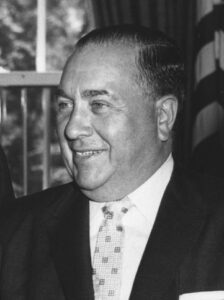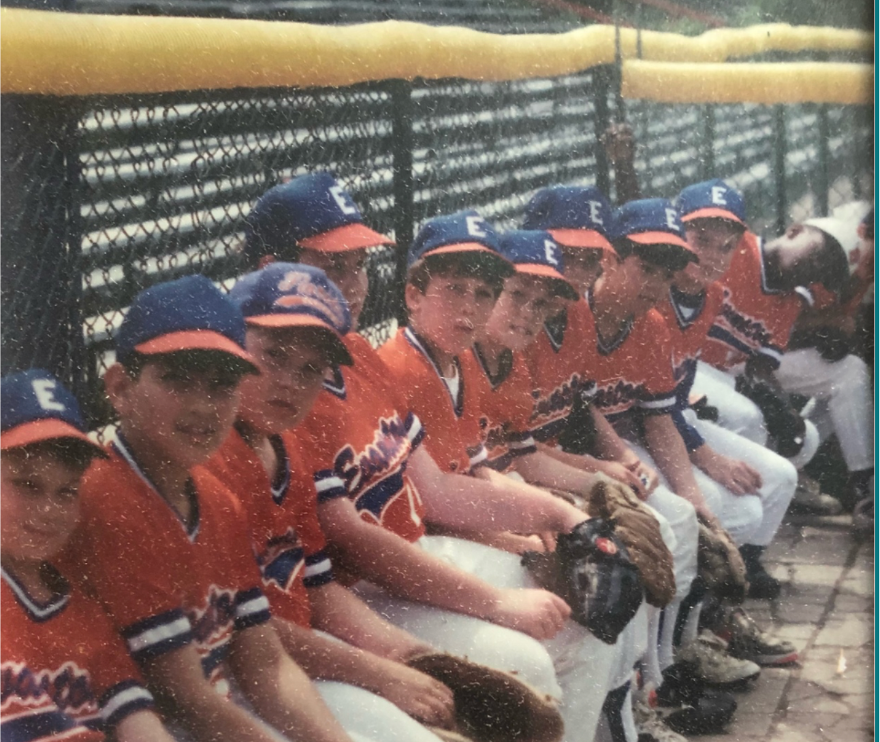
Coaching Little League Baseball in Evanston
By Michael Ledwith
May 23 ,2025
It’s May 20th and 42’F.
Wind NE from the lake makes it feel 8’F.
As cold as it was, I imagined, standing guard outside Bastogne, Christmas, 1944. Waiting for the 3rd Panzer Division to attempt to roll through on its way to Antwerp.
As cold as it was coaching Little League during any Spring in Evanston back in the day.
The hawk biting through my thin, fashionable, Thin Lizzy tour jacket. Freezing my face and head because, like Jack Kennedy, I don’t wear hats.

The original Mayor Daley. “Don’t wear no funny hats. Don’t back no losers.”
Da Mayor.
This morning, a day like most days, if memory serves, at the start of Little League Baseball season in Evanston.
My neighbor and I coached our sons from T-ball through Pony League. Experiencing Christmas outside Bastogne ‘44 like weather during the first month or so of practice.
We froze. The kids never noticed.
C’mon coach, it isn’t sleeting that hard!
Coaching Little League was one of the most rewarding experiences of my life. All kinds of kids, from all over the world, from every sort of home life, wanting to play the great American sport: baseball.
If from a foreign country, eager to plunge into the great melting pot that is America.
When we coached, the refugees and their kids were from the former Yugoslavia. Parents uprooted in an afternoon from normal lives. Profession gone. House gone. Families scattered. Violent death all around.
Mortal enemies there, thrown together here.
All desperate to become Americans.
Now, here, they were Americans.
Not Croat or Serb or Orthodox or Muslim.
Kids who didn’t know which hand to put their glove on. No clue as to how to throw a baseball. Moms and dads who had no idea what a baseball glove was for.
How to throw. Which hand to throw with. What a bat was.
But they wanted to be able to throw the ball around with their kids in the late afternoons after work.
On weekends like they saw their American neighbors do.
American kids knew the basic basics: glove, ball, bat but, wanted to learn how to become great ball players. To pull the ball. To bunt.
To turn a double play (our team did it once in a game and the whole team ran around the bases in celebration as the umpires laughed and cheered).
To learn what the ‘infield fly’ rule was. And, on and on, immersing themselves in the magic of American baseball.
I taught them how to break in a new glove.
Work in the Glovolium. Put a hardball in the pocket. Close the glove around the ball. Slip three powerful rubber bands around the outside to hold the closed glove around the hardball, just so.
Put the glove under the bed before you went to sleep.
By the next morning it was a baseball glove.
My neighbor and I would meet at the practice field near Mount Trashmore on weekday afternoons at four. Straight from work. Unload the long canvas bat bag. Grab the ball bag.
Hopefully, one of us would remember to buy snacks for the team.
The players as eager to eat ‘coach bought’ snacks as to learn about choking up.
Mom snacks were raisins and sliced apples.
Dad snacks were Snickers, Hershey bars, or chocolate covered peanuts.
Peanuts, you know!
Health food! In every trail mix for a reason.
No kid ever complained about the soggy rain-soaked fields that ruined work shoes. No kid complained about the wind. No kid complained about the cold.
No kid noticed the coach’s blue lips. The tears in their eyes from the wind. Or that their hands were trembling as they hit fly balls to the outfield.
No Evanston parents would brave the Shackleton like conditions to watch practice. The newly arrived refugee parents always came.
If work permitted.
Watching from behind the batting cage.
Avoiding being hit by errant throws or foul balls.
Silent.
They learned to cheer later in the season.
After practice, the parents gathered around with their sons and daughters, using them as interpreters. Peppering us with questions. Asking us to make sure they were gripping a baseball correctly. How do you play catch? How do you field a grounder? What is a grounder? Where’s the field? Field like wheat? Corn? What is a line drive? A pop up?
What was a strike? A ball?
Then the first real game.
Pitching, when pitching started after T-ball, after coaches tossing underhand to batters, was tough. Endless walks. Tears.
Throwing a baseball over the plate was not easy for kids from Montenegro.
Mark and I played every kid in every position in rotation.
Except pitching.
Pitching could be cruel.
But every kid got to play in every game.
The years went by.
Global Warming never visited Evanston Little League in April.
The kids got better. Some dropped out. We started playing baseball, baseball. The kids tried hard. All the kids really wanted to win.
Natural athletes emerged. Really good players emerged. Bad athletes and those who never mastered catching a fly ball emerged. But everyone played with enthusiasm. No whining. Little sulking.
Neither snow nor sleet nor rain deterred them.
Basically, we coached the same team for a few years.
I wrote a John Kass News contribution about winning the Championship one year. And one about playing Little League in Japan.
The worst player on the team wound up playing the key position, third base, in the last inning of the championship game. We were one run ahead. Bases loaded. Two out.
The next batter pulled one down the third base line, our guy dove to his right, knocked it down in a brilliant bit of baseball, pivoted, and threw the runner out at first.
We were champions.

The kid who made the play is sixth from the left.
By the end of that season, the Yugoslav parents knew what a hard grounder, and throwing the runner out at first meant.
I look outside as I write this, trees bent into C shapes by the NE gale. Rain spits against the windows. The temperature has climbed to 45’.
I wish I was coaching Little League this morning.
It’s not sleeting or snowing.

The author played for the Sagamihara Dodgers, Armed Forces Little League Japan. His dad was an umpire.
-30-
 Frequent contributor Michael Ledwith is a former bag boy at Winn-Dixie, who worked on the Apollo Program one summer in college. A former U.S. Army officer, he ran with the bulls in Pamplona and saw Baryshnikov dance ‘Giselle’ at the Auditorium Theater. Surfer. Rock and roll radio in Chicago. Shareholder, Christopher’s American Grill, London. Father. Movie lover—favorite dialogue: “I say he never loved the emperor.”
Frequent contributor Michael Ledwith is a former bag boy at Winn-Dixie, who worked on the Apollo Program one summer in college. A former U.S. Army officer, he ran with the bulls in Pamplona and saw Baryshnikov dance ‘Giselle’ at the Auditorium Theater. Surfer. Rock and roll radio in Chicago. Shareholder, Christopher’s American Grill, London. Father. Movie lover—favorite dialogue: “I say he never loved the emperor.”


Comments 25
Great column, had me glued to the screen. There is something magical about the entire process of baseball from the time we were kids. Incorporating the parents of immigrants, their interest in becoming American and the passions they had was just priceless. Thank you Sir.
Author
Jim:
100 percent agree with you. I’m a son of immigrants. I reached for baseball because I wanted so much to be an American.
Thanks for reading, Jim.
JK
Thank you is not enough! Great job!
Nice. I don’t use the term “heartwarming” often, if at all. Too cynical for that word, but your story brings that to mind. After all the happenings in the world, the tragedies and anger, reading a story about little league baseball reminds me of the simple pleasures and small moments where good wins over evil.
Great life story coach. Only in America!
Excellent! Those were the days. Weather? What weather? Game on!
Baseball was [is] one of the things that bound people and generations together. My father never missed a game in my little league or Babe Ruth League days. I played organized ball into my mid 20s and coached or umpired into my early 50s. I remember those freeeeeeeezing March and April days. My favorite memory [outside of an unassisted triple play] was going out to left field for a relay and then seeing our leftfielder come charging back from the swamp behind left, without the ball, yelling “… there’s a freakin [yes he did say freakin] snake back there!” It was a terrified garter snake, but wrapped around the ball. Both teams ran out to see it. My first bench clearing brawl. I’m not sure if the batter actually touched home plate, but he got the home run.
Thank you Michael, as a father of 4 boys, the memories of little league are some of my most treasured. So great to remember this morning.
And then comes summer. Baking hot Sun. Maybe 95 degrees. Because of his size and fearlessness, our son was usually the catcher wearing a full helmet too small for him. Buckets of ice water and towels to dip and drape over necks and shoulders. Ah, those were the days.
My dad was one of those immigrant parents who didn’t understand the rules of baseball, basketball or American football. He arrived in the US in 1951 from the former Yugoslavia under HST’s Displaced Persons Act. Two sons later, you could find him sitting in the bleachers of a little league game or a basketball game or standing behind the end zone watching his “boys” participate in American sports. At the end of each game my dad never failed to hug us and let us know how well we did. He made sure we stayed focused on school and active in any athletic activity that would keeps us involved. My dad passed in 2006 at age 86. He was proud of us and never hesitated to tell us, whether it was athletics or academics. He was there for us. I’m forever grateful to have had him as our dad.
The Little League season, as we knew it, was always supposed to be over by around the 4th of July in order to accommodate some family vacation time. This meant “tryouts” (where coaches and managers could get a peek at prospects) had to be held mid to late March. More often than not, on that day, snowflakes were flying as well as baseballs. By May, the season was in full swing, with rainouts and makeup games messing up the schedules and – with the upper age brackets – causing much angst regarding pitching availability. If your kid happened to be talented, there was also the all–star team that formed to extend the season for some families with the possibility of Sectionals play. (Forget the family vacation!) However……..FOND MEMORIES.
Having coached t-ball through high school. Parents eventually learned what the infield fly WAS, but many still don’t know the reason behind it. The intricacy of the rules is a wondrous experience for all.
Great story as always Michael.
John, you have a great one in the rotation!
Coming from a family of 3 girls that didn’t play sports, I was as unfamiliar with t-ball as any immigrant. Taking my oldest son to his first practice, I listened to the coach tell us the schedule of practices along with any equipment needed. I shook my head in agreement, then relayed to my husband what was needed. My only question to him was “what’s a nut cup?”
Lol!
Thank you Michael. I too am a refugee living in Evanston, a refugee from the South two generations removed, but I find a great deal of comfort here, even as liberal, and now even perhaps as intolerant as the town may be. There have been a handful of other refugees from Slave holding families that I have met in Evanston. One lady, a direct descendent of Robert E Lee and an Indian slave – ans she knows as much or more about the Lees as anyone in the world practically – and she is immensely proud, as am I.
WRT to the weather during baseball season, it is RAW. I have learned that the Lake has a vote this time of year
Thank you for your reminiscence, very much and much!
You brought back so many memories! Teaching fundamentals of baseball to eager kids was what I enjoyed. Seeing the growth of the worst kid at the start of the season to at the end of the season a solid team player was very gratifying. Life long memories and friendships between team mates and parents is what little league baseball is all about. BTW, the first year we were the worst team in the league and the second year we were undefeated and won the championship.
Michael, thanks for the wonderful words which brought back many memories of being blessed to coach my own son’s baseball teams. It also reminded me of one early May evening of driving home from work to Orland Park and hearing on the radio that the Kane County Cougars had postponed their game that night due to the colder than normal temperatures. Yes, it was currently 37 degrees at Midway and professional baseball players were not taking the field, but the team of 7 year olds I was lucky enough to help coach, were getting ready to play the great American game of baseball.
I coached on the NW side of the city for many years, with the same types of stories and situations (but no championships). This brings back some good memories. Early seasons were always brutal, at least up until about now…when school was over. Then it got a little warmer. I spoke of my experience here –
https://open.substack.com/pub/kenmacko/p/white-cap?r=1q3wqu&utm_campaign=post&utm_medium=web
You tell a great story…I to wish I would be coaching, teaching. But I know in today’s world, it just wouldn’t be the same. Thanks for the memories.
Thanks for playing every kid in every rotation.
Winning is important but every kid wants a chance to play,
And every parent wants to see their kid throw a ball and run the bases.
Great coaches know that part of the game is building a team and having fun!
Enjoyed your column so much! Great story of coaching. Thought about my 40 yrs old son playing T Ball.
Heartwarming on a colder Memorial Day than most. Thank you for volunteering to be a coach to children who need inspiration to be better in all areas on the field. My younger brother loved little league so much that I wanted to join. However a little girl was not welcome and thus a softball league was born from the experience. A mom of five little boys who played little league started the softball league for the little girls that wanted to play in Harwood Heights. Mrs. White, I will forever be grateful for you.
Michael Ledwith, I am thankful for you and your gift to compose literature. You paint a scene with your words and experiences and it is truly a gift. God bless you.
Thanks. Well done.
I was on a team of misfits that weren’t able to make it onto established teams so they created an expansion team. We didn’t care that much, we were just happy to play. When I think back on it, I could have been a trendsetter. I was kind of trans, threw right, batted left.
I have fond memories of playing LL baseball, learning the game, and playing fundamental baseball as we were taught. That was 1961, and I’m now 74.